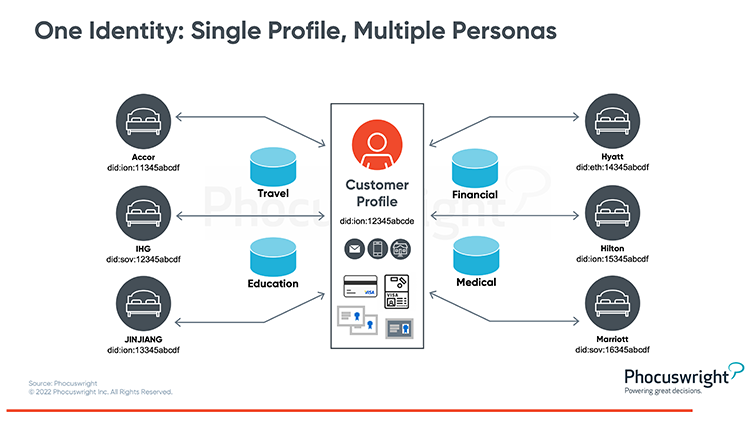A win/win/win: the self-sovereign identity opportunity for travel
- Published:
- November 2022
- Analyst:
- Phocuswright Research
New decentralized models for digital identity, often termed self-sovereign identity (SSI), have been in active development since 2015. Promising to dramatically improve the trust in internet identity for all parties - people, organizations and even things can now have a trusted and provable digital identity according to Phocuswright’s latest research report on the technology Self-Sovereign Identity: Unlocking Seamless Travel. In turn, this allows peer-to-peer relationships to be formed just like in the real world. And it is this real-world facsimile that makes the decentralized model of identity representation so compelling when compared against the digital identity verification models that are widely used today.
At the foundation of SSI are impactful technologies like the TCP/IP protocols that enabled the internet, the http protocol that gave birth to the web, and the GSM standard that brought about the mobile revolution. These technologies enable consumers to manage their personal information behind a verified digital ID and distribute trusted information to trusted sellers who equally participate in and benefit from the new digital identity capabilities.
SSI awareness and adoption has been further accelerated by cryptocurrencies, which introduced blockchain and digital wallet technologies to many people for the first time. The worldwide COVID epidemic, during which governments required the digital communication of health status prior to travel and for entry to restaurants, bars and shops, also helped spread awareness.
A tidal wave of new technologies is coming, introducing disruptive core technology capable of changing the status quo - the centralized model - and opening the possibility of peer-to-peer interactions between digital identities.
For hospitality and travel (H&T), a target-sector for SSI, the opportunities are significant:
- The possibility for cross-brand loyalty models to emerge
- Substantially improved shopping experiences for travelers, including searching the universe of travel without being forced to use an OTA, and receiving personalized rate quotes based on product requirements, preferences, memberships, age, affiliations, past purchases, entitlements, etc.
- Vendors receiving accurate information direct from the customer with every interaction
- Permissioned, two-way communication with customers without using Facebook, WhatsApp or similar apps
- True seamless digital customer journeys where information flows automatically between providers (e.g., air, airport, ground mobility, hotels, tours and attractions, F&B)
- A reduced need to store customer data, simplifying regulatory compliance (GDPR, CCPA, etc.)
- The possibility for new intermediary types to emerge: H&T identity providers
- The availability of privacy-preserving digital health credentials, if required
Further opportunities for travel companies include cross-brand loyalty, a single travel profile across all travel sectors and more.

(Click image to view a larger version.)
This article, free for Phocuswright Open Access research subscribers, is part of a content series that explores some of the most significant technology-driven trends that will influence travel distribution in 2022 and beyond.
For more deep insights into the travel markets covered by Phocuswright, subscribe your entire company to Open Access. This subscription puts the entire Phocuswright research library and powerful data visualization tools at your fingertips. There’s a reason executives around the world trust and reference Phocuswright research and data on a daily basis. Explore for yourself why.



.png)







